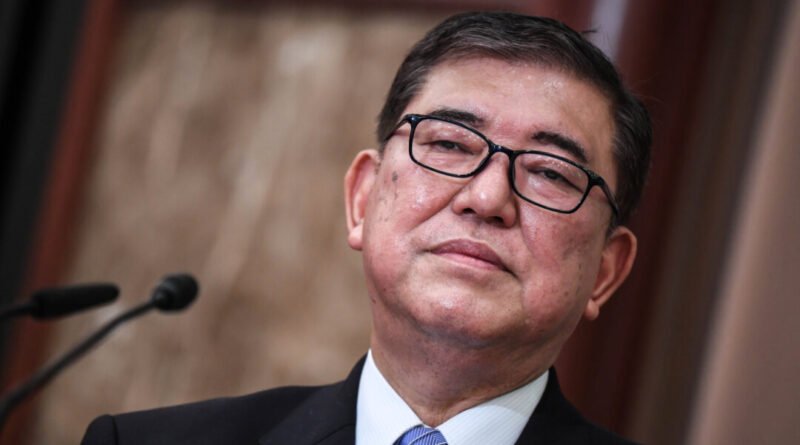Japanese lawmakers visit Taiwan for discussions on ‘security matters’
Beijing responds by warning Japan to be prepared to ‘pay a heavy price’ if it interferes in China’s plans for Taiwan.
A bipartisan group of Japanese lawmakers recently visited Taiwan to discuss strategic ties between the two countries, sparking a strong reaction from China, as expected.
The Japanese legislators met with Taiwanese President Lai Ching-te at the Presidential Office last Wednesday. The next day, they were hosted for a luncheon by Taiwan’s minister of foreign affairs, Lin Chia-lung. The delegation, led by Shigeru Ishiba, a former defense minister of Japan and a potential prime ministerial candidate, also included other members of the Japanese House of Representatives.
During the luncheon, Lin highlighted the geographical proximity of Taiwan and Japan, their shared democratic values, close relations between their peoples, and the threat of authoritarian expansionism they both face.
He emphasized the importance of establishing a security dialogue mechanism between the two countries to enhance responsiveness in case of future emergency situations.
On his final day in Taipei, Ishiba, a former secretary-general of Japan’s ruling Liberal Democratic Party (LDP), reiterated his intention to run in the LDP’s upcoming leadership election scheduled for Sep. 27.
During the luncheon, Ishiba proposed that Japan and Taiwan collaborate with the broader democratic community to prevent East Asia from turning into “the Ukraine of tomorrow,” as per a Ministry of Foreign Affairs statement. He suggested strengthening deterrence capabilities and jointly maintaining peace and security in East Asia and the Taiwan Strait.
The Japanese delegation also met with Taiwan’s vice president, Hsiao Bi-khim. Ishiba informed reporters after the meeting that in case of a “contingency in the Taiwan Strait,” Japan and Taiwan will closely cooperate.
“It is crucial to make China understand that even if it resorts to force, it will not achieve its goal or will face severe repercussions,” Ishiba emphasized.
Amid a Political Transition
The visit by the Japanese delegation occurred during a leadership transition in the LDP, with Japanese Prime Minister Fumio Kishida currently at the helm.
Ming-Shih Shen, director of national security research at Taipei’s Institute for National Defense and Security Research, noted the significance of the Japanese delegation comprising members from different political parties.
He also highlighted the importance of Ishiba reaffirming his candidacy for the LDP chairmanship during the Taiwan visit, indicating a potential path to becoming Japan’s next prime minister after the parliamentary election, Shen said.
According to an Aug. 15 survey by Kioicho Strategy Institute, a political consulting group, Ishiba emerged as the leading public choice for prime minister, Japanese media Nippon reported.
Shen pointed out that Ishiba’s speech on Aug. 15 showcased a deepening relationship between Taiwan and Japan, underscoring the mutual interests of the two countries.
Before 2022, Shen noted that Ishiba held a pro-Chinese stance. However, since 2022, he has shifted his position due to China’s expanding influence and aggressive intentions under Xi Jinping’s leadership.
Irrespective of the election outcome, Shen suggested that Japan could counterbalance China’s tough foreign policy and strained relations with the United States.
‘Taiwan’s Defense Is Japan’s Defense’
The discussions during the delegation’s visit with Taiwanese officials and political leaders focused on the geostrategic relations between Taiwan and Japan. Lin’s call for establishing a “security dialogue mechanism” highlighted the defense and security implications of evolving Taiwan-Japan ties, experts indicated.
Grant Newsham, senior fellow at the Center for Security Policy and Japan Forum for Strategic Studies, highlighted Taiwan’s crucial location in these discussions. Taiwan lies along the sea lanes of the South China Sea, through which a significant portion of Japan’s trade and energy imports pass, he noted.
“For many years, some Japanese officials and numerous military officers have emphasized ‘Taiwan’s defense is Japan’s defense.’ This holds true,” Newsham asserted, as China could disrupt Japan’s vital supply lines by controlling Taiwan.
If the People’s Liberation Army of China is stationed in Taiwan, China could isolate or encircle Japan, making it easier to expand its military activities into the Pacific region, he explained.
“If Taiwan falls … it will shake the foundation of the U.S. military presence in the region and wider American influence, on which Japan heavily relies,” Newsham pointed out.
Shen noted the persistent security challenge posed by China to Japan, the United States, and Taiwan. The three countries are collaborating due to shared interests in geopolitics, global supply chains, and democratic principles, he stated.
Despite understanding the common security threat from China, Newsham observed that Japan has been unable to take the necessary steps to bolster Taiwan’s defense.
“Perhaps it may do so in the future, but it could be too late by then,” Newsham cautioned.
Nonetheless, given the evolving geopolitical landscape, Shen predicted that more members of Japan’s Congress will visit Taiwan, as China cannot halt this trend.
Above all, the fact that despite being aware of the potential risks, the visit proceeded indicates “a certain level of Japanese commitment to Taiwan,” Newsham stated.

China Reacts
The Chinese Embassy in Tokyo did not take kindly to the Japanese delegation’s visit to Taiwan. On Aug. 16, the embassy issued a stern warning that Japan should prepare to “pay a heavy price” if it intervenes in China’s Taiwan plans. Experts believe these warnings signal China’s unwavering commitment to its Taiwan objectives.
China views Taiwan as a renegade province and insists on its reunification with the mainland, even if by force.
Newsham suggested a crucial lesson from Beijing’s response: There is no feasible deal with China that would deter the communist regime from pursuing its goals to dominate Taiwan and the broader Pacific region.
Shen highlighted that when Kishida announced his decision not to run for the LDP chairmanship, Taiwan’s President Lai congratulated him in a social media post. In contrast, when Kishida responded to three heads of state including Taiwan, it symbolized Japan’s acknowledgment of Taiwan as a sovereign entity.
This viewpoint is likely why the Chinese Embassy in Japan reacted angrily,” Shen noted.
According to Newsham, China’s criticism of Japanese leaders and lawmakers visiting Taiwan is not surprising given the historical context. “These complaints are as predictable as the sunrise in the east each morning,” he remarked.
Almost a year ago, comments by former Japanese Prime Minister Aso Taro at the Ketagalan Forum in Taipei stirred protests from Beijing.
Aso stressed the need for Japan, the United States, and Taiwan to display resolve in defending Taiwan against China’s escalating aggression. He emphasized the necessity to establish a strong deterrence mechanism and readiness to fight, to safeguard Taiwan.
In response, a spokesperson for the Chinese Embassy in Tokyo criticized Aso, accusing him of speaking nonsense and overstepping boundaries by linking China’s internal affairs to Japan’s security.
Newsham highlighted that visits by influential Japanese politicians to Taiwan reflect Japan’s concerns about Chinese threats to Taiwan and show support for a free Taiwan. These visits proceed despite anticipated Chinese backlash.
“This demonstrates a level of Japanese dedication to Taiwan,” Newsham concluded, despite potential measures by China to harass Japanese businesses operating in China and even to detain more Japanese citizens residing there.
This firm commitment to Taiwan, amidst the acknowledged risks, indicates a robust Japanese stance on supporting Taiwan’s security, he explained.






